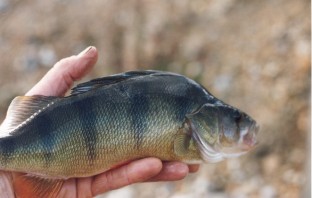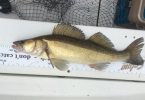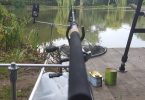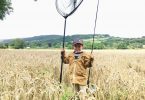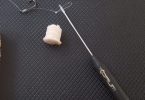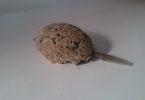Although I have caught perch during every month of the old coarse fishing season, my favourite time of the year is the autumn. As the leaves start to change colour and drop from the trees, that is the time that the perch start to shoal and that is probably the best time to fish for them.
They are not the greatest fighters in the lakes but I find them one of the most interesting, there is nothing quite like the sight of a really big perch with it’s double dorsal fin, black stripes and red fins. It’s stocky body with pointed gill covers and rough scales is like an armour plated warrior looking for a fight.
Exaggerated
Many anglers have exaggerated the weight of the fish they catch and with perch it is easy to understand. They look bigger than they really are and even the sight of a modest 1 1/2lb fish can give the impression of a real monster to those who are not familiar with such creatures. I remember not so very long ago I landed a perch of 1lb l2oz from a local water in front of three young carp anglers who were amazed at the fish. Two of them said it was the biggest perch they had ever seen.
It is because of my particular interest in the species that I joined the Perchfishers Club to pool information with fellow enthusiasts. Everyone has their own idea on what rigs to use and the experience gained from the other anglers in different parts of the country can help you to catch more fish in your own area and of course, the same applies to them.
Vulnerable
My perch fishing has spanned forty years, from catching them on the Pevensey Marsh in the fifties, to landing them from commercial fisheries in the nineties. Despite the fact that they have the appearance of being really tough perch are nothing of the sort and are quite vulnerable once caught. A deep hooked fish will often die and a fish that bleeds is almost certain to perish. It may swim away when released, but often it will appear a few minutes later in distress on the surface. It is perhaps fortunate for the perch that they do not have the same appeal as carp, for carp are hardy and rarely suffer through handling. This is not the case with perch, so for those who like me fish for them, would do well to remember their vulnerability. Strike early rather than late and try to use hooks with small barbs for easy unhooking. Barbless hooks would be the best hooks to use, but if you are going to fish with small lipped hooked livebaits as I sometimes do, then you have a problem with keeping them on the hook.

Waggler Fishing
As far as livebaits are concerned I do not use them for pike any more, but I find lip-hooking livebaits acceptable for perch fishing. I am aware that many clubs do not allow livebaiting and I respect this. On these waters, perch anglers are left with either worm fishing, deadbaiting, spinning, or fly-fishing, though do not underestimate the humble maggot. Many a good perch has been taken on maggots by anglers waggler fishing and loose feeding with maggots, likewise swim feeder fishing.
In fact any sort of groundbait which attracts small fish into a swim is almost bound to attract a perch or two. Whether certain types of groundbait attract perch or not has for me yet to be proved, though some anglers believe it does. Steve Burke, a good friend of mine and a leading member of the Perchfishers Club, believes curry flavoured groundbait actually attracts perch. Well I must say he has caught a lot more bigger perch than I, so at least I respect his views, but I wonder whether it’s the small fish that has attracted the perch. If we believe perch are attracted by curry we must also believe that perch have a strong sense of smell, and if that is so are all fish gifted in the same way? It would seem that either to a greater or lesser degree they are, certainly anglers think so, otherwise they wouldn’t bother with all those different flavourings one can mix with groundbait or boilies. Why is it, for example, that chub eat strong cheese? Are they attracted by the smell or taste? There is much we still do not know. Pike, it appears, are attracted by the oil of seafish deadbaits.
Same Colour
But! Back to perch, maggots can be responsible for the downfall of big perch, indeed I myself have caught 21b plus perch on double red maggots. Like flavouring, I do not know whether the colour makes a difference, but I understand that fish can tell the difference. After all if trout cannot tell what’s the point of fly fishermen tying all different coloured flies, they may just as well use the same colour throughout. Certainly when spinning or fly fishing for perch I have found orange and yellow most likely to succeed, yet pike appear to respond to the red tassel of a spinner. Who knows for sure whether it’s the colour or the confidence of the angler using it.
Worms are, without doubt, a very good bait for perch, but I have known them to completely fail in some waters. Very coloured waters are not generally so good for worm fishing and these waters are best fished with lip hooked livebaits.
Groundbaiting with chopped worms is a good method when worming for perch and one friend of mine pre-baits with them for considerable success. Worms work better than livebaits on some waters and these waters are usually the ones that hold a large head of pike. Pike can be a real menace when fishing for perch, but although they will pick up a worm, they are not as likely to as they are small livebaits and deadbaits. The problem is that even a large fish bait for a perch is a small one for a pike and that means that every jack, even below a pound is likely to take a fishbait. This is certainly the case on the Rother, which is now full of perch. On this water if you are after perch the best bait, in my opinion, is a large lobworm, though eels can be a nuisance, especially in the summer. There are plenty of other baits which can be used for perch, but few anglers try them. Leather jackets, the larva of the crane fly (Daddy-long-legs) is an excellent bait, but they are difficult to obtain since they live in the turf. Every now and again I dig one up in the garden, and when I do I hang onto it for bait. The maggot type of creature that can be found under cowpack are also good baits. I think that they are the larva of the horsefly, though I must admit I haven’t used them for some time now, but when I was a boy we often used to collect them and I have caught no end of perch on them.
Small red worms are okay, and so are brandlings, but the bigger the better. Perch have absolutely enormous expanding mouths and, I think, generally a bigger rather than smaller bait is what they want. One would think that slugs would be a good bait, but although I have caught chub on them I have yet to catch a perch. Even so, a friend of mine who kept a perch in a tank for a few months, fed it with slugs which it took with the ferocity you would expect from a predator, so perhaps it’s just that I haven’t used them at the right time. After all, when I caught the chub I was fishing for them in k
nown chub swims. Perch, I am sure will take slugs, but whether they are a better bait than worms is questionable. Personally I doubt it, but perhaps on a water where the perch have been caught, a different bait could be the answer. Now whether these other baits I have mentioned are worth extended use is difficult to say, but they are worth consideration. Whatever bait is used, groundbaiting will help in most cases. As I previously mentioned, exotic flavours have yet to prove their worth to me, though I believe there is something in what has been written about them.
Perimeter
Let’s face it, it doesn’t matter what species of fish a flavour attracts providing it is small, for where you have small fish you can be sure the perch will not be far behind. They will stay just on the perimeter of the feeding fish, waiting for the right moment to strike. A bait strategically placed may pick them up. If a flavoured bait gives you more confidence then use it. Little and often is probably the best policy, perhaps feeding in a couple of small balls of groundbait to start with and then throwing in a little more each fresh cast. Maggots are a good bait to loose feed with and so much the better if used over a bed of groundbait. One angler that I know swears by curry powder sprinkled on his maggots and I must say I have tried it myself with some success, but whether it is the taste or smell that attracts the fish is difficult to say. The one thing that I do know is that it makes the maggots wiggle more. It would make us wiggle too if we were dropped into a giant tin of curry powder. So rather than the taste and the smell it could be the extra movement that attracts the fish, but perhaps we shouldn’t analyse things too deeply, but just accept it as an improvement.
Now having examined baits extensively, I am beginning to feel like a modern carp angler who believes the most important aspect of fishing is the bait, when in fact it is not. Location is far more important. It doesn’t matter what bait you have, or how good it is, if you are not in the right place you will not catch anything and that goes for all types of fishing.
I must agree, anglers who fish long sessions have more chance of being in the right place at sometime or another, but anglers who only fish an evening, or a day have got to get it right fairly quickly.
It is worth spending some time watching for movements of perch for they often reveal themselves as they attack a shoal of small fish, a dozen or more small fish spraying out on the surface in all directions is usually a sign that a perch is on the rampage. It could be a pike but the more fish that jump out at a time, the more likely it is to be perch.
Other places to look for perch are features, but not necessarily surface ones, though surface features like; islands, reed beds, incoming streams, overflows, over hanging trees and bushes are all places worth fishing, but other submerged features are also worth tracking down.

Underwater Snags
The margins can be good places, especially if there is an undercut bank, or the bank is sheer. A gradual slope where a river has been dredged is not nearly so good. Old lily pad beds, which have died off, sometimes produce a few fish and other underwater snags are also worth a try, but if all else fails look for the shoals of small fish. Perch will not be too far away.
In late autumn when the temperature drops not only do the perch shoal up, but the small fodder fish do the same. The problem with this is they are not always easy to find and often move from area to area. One would expect that they would be in the deeper water, but that is not always the case. On the small lake no larger than two acres I once found a shoal of rudd in less than 2ft of water and on the edge of the shoal was a perch of three pound. The air temperature was just a few degrees above freezing and the chill factor was kept lower with a bitterly cold north east wind.
Perch can be caught in all depths of water even in very cold conditions, but if you want to know where they are, find the small fish first. If you can’t, fish to whatever feature takes your fancy.

